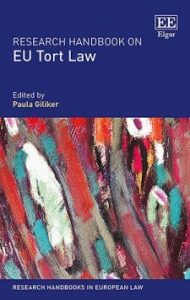By Prof Paula Giliker, Professor of Comparative Law (University of Bristol Law School).
 October 2017 marked the publication of the Edward Elgar Research Handbook on EU Tort Law. This is part of the series of Research Handbooks in European Law published by leading Law publishing house, Edward Elgar, which offer authoritative reference points for academics, students, and practitioners studying or working in EU law, private law and comparative law. The aim is to be comprehensive and informative, but also accessible for those approaching the subject for the first time.
October 2017 marked the publication of the Edward Elgar Research Handbook on EU Tort Law. This is part of the series of Research Handbooks in European Law published by leading Law publishing house, Edward Elgar, which offer authoritative reference points for academics, students, and practitioners studying or working in EU law, private law and comparative law. The aim is to be comprehensive and informative, but also accessible for those approaching the subject for the first time.
The Research Handbook on EU Tort Law is edited by University of Bristol Professor of Comparative Law, Paula Giliker, but also contains contributions from other Bristol academic staff including Dr Jule Mulder, Dr Albert Sanchez-Graells and Professor Keith Stanton, together with 14 other contributions ranging from the UK and Ireland to France, Germany, the Netherlands and Hungary. This truly international project seeks to examine the extent to which EU-sourced law (directives, judicial decisions, regulations, Treaty provisions) have created new rights in the law of tort on which claimants can rely in either the Court of Justice of the European Union (CJEU) or national courts.
The variety of areas of law in which EU-sourced tort law can be found is striking, as highlighted in Giliker’s introductory chapter, ‘What do we mean by “EU tort law”?’ Contributors discuss actions in the CJEU (Gutman), State liability for breach of EU law (Granger), product liability (White), competition law (Odudu and Sanchez-Graells), data protection law (Stauch), employment law (Mulder), insurance law (Davey), financial services law (Stanton) and the law relating to unfair commercial practices (Riefa and Saintier). Further contributions examine what we mean by compensatory remedies in EU law (Leczykiewicz), whether we can identify a culture of EU tort law (Niglia and Knetsch) and the possibility of harmonising European tort law more generally (Martin-Casals, Blackie and Faure). Finally, Giliker examines the future of EU tort law, both as a substantive area of law and as a concept in need of clarification and further academic debate.
The Research Handbook was written between 2016-2017, that is, during a period of time in which the UK voted to leave the EU. Indeed, the UK Parliament is currently debating the European Union (Withdrawal) Bill. In many senses, this makes the Handbook all the more timely in providing valuable information highlighting how EU law has improved the position of claimants by giving them rights to sue in tort which did not previously exist. There is a danger that we take for granted, for example, consumer rights which protect us from defective products and unfair commercial practices or that our competition law has been improved in line with measures found in the European Treaties. In the era of Brexit, it is important for us to examine reforms introduced by EU (tort) law and, indeed, choose which we wish to retain. The Research Handbook also offers a perspective from beyond the United Kingdom, giving the reader a critical appreciation of the operation of EU tort law across a range of disciplines. In relation to the UK, EU tort law and the remedies it provides will, in many cases, survive Brexit and will continue to exist (and develop), embedded in areas of law such as employment law and consumer law. It is to be hoped that the Research Handbook on EU Tort Law will provide a valuable resource enabling readers to understand the conceptual basis for EU tort law and its many-varied identities across private law.
For further information, see http://www.e-elgar.com/shop/research-handbook-on-eu-tort-law. For the electronic version see https://www.elgaronline.com/view/9781785365713.xml – with chapter one free to access!
